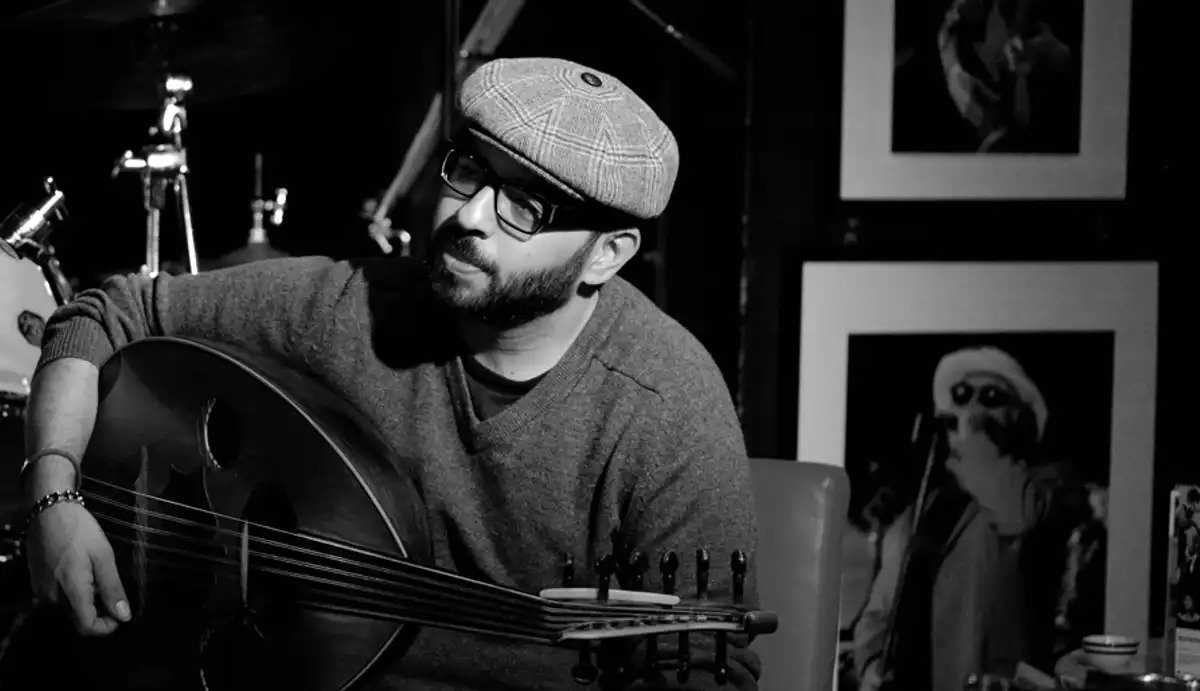Al-Andalus is alive again when Attab Haddad starts to play. An oud-player and composer with a passion for Flamenco, Iraqi-British Attab shared Turkish coffees with Skin Deep’s Courtney Yusuf to chat career priorities post 9-11, the value of musical fusion, and London’s siren call.
*
Courtney Yusuf: How did the oud come into your life?
Attab Haddad: Way before the oud I used to make dance and techno music in the 90s. I never did it professionally – I was at university at the time and just very into clubbing. I then graduated and worked in the City. I knew I hated it and quit shortly after September 11. It kind of highlighted that that was not the right place to be. People I’d worked with for a couple of years – people I’d go out drinking with on the weekends – turned overnight. It was pretty shocking. Suddenly they would joke, ‘Have you got anything under your jacket?’
I remember I was in Canary Wharf on September 11. We were evacuated that day and I saw one of my managers in the lift as we were going down. He gave me a look like I’d bombed the towers myself. This look of utter contempt and hatred. I said to myself ‘I don’t even wanna do this, why am I here? So I quit. I didn’t really know what I was gonna do after. Music wasn’t really on the cards. I thought I’d study sound engineering and I started playing the oud. I started taking lessons myself and then at the end of the first year I thought: I want to do this professionally. So I applied to go and study in Egypt and then to do a Master’s at SOAS.
CY: How did it feel to pick up an instrument like the oud in that political climate?
AH: I had a clear understanding of my background growing up – I’m very aware of my history, my family’s history and where we come from. I spent part of my childhood in the Emirates, I’m fluent in Arabic, and I visited Iraq as a child. But I would say that it definitely shone a light on my culture, especially at a time when there was so much negativity associated with it. To hear something so beautiful was a good feeling. It’s not all about religion, killing and political dissonance. There’s beauty that comes out of this region as well.
CY: And flamenco?
AH: When I heard flamenco, it was a revelation. I wanted to learn more about it so I become completely obsessed with it for years. The rhythmic element is just brilliant – I think bulerías is one of the greatest rhythms that mankind has ever known! A lot of Middle Eastern music falls on the beat, where flamenco is the complete opposite. I wanted to play flamenco on the oud. You can’t do everything as it’s not a fretted instrument and so I started writing my own stuff.
CY: Do you ever receive any opposition?
AH: Oh yeah, from purists on both sides. A lot of people will come up to you and say ‘that’s not really flamenco’ or ‘that’s not really Middle Eastern music,’ but that’s not really the point, and it’s not being presented as such either. It’s a way of highlighting the commonalities. It’s not overtly political or anything but to see people from different cultures – which are supposedly ‘incompatible cultures’ – playing music that’s quite similar, it’s making a statement in some ways isn’t it? That there’s more in common than what a lot of people want to acknowledge.
CY: Is London a good place to be an oud player?
AH: No, not really. Not for this sort of music any way. You just don’t get the big names from my world coming here very often. In Paris or Berlin there’s a lot more activity around this sort of music and a wider pool of musicians that play, especially after what’s happened in Syria. There’s also big Turkish communities who play this music, and North Africans in France, but here, it doesn’t exist. I know a lot of people who have come here and struggled to do anything because they only play the traditional sounds. The thing that got me ahead was the fusion. If I’d just played classical Middle Eastern music I don’t think I would have been able to make a career of it in London. I realised really early on that I’ll never be a traditional Middle Eastern oud player because I’m not. You have to play to your strengths rather than trying to emulate something you’re not.
CY: Is there a particular audience you like to play for most?
AH: I like an interactive audience, it doesn’t really matter where. When you play for a classic Western audience, I find it a bit weird. With Mediterranean and Arab audiences, they’re so vocal – if they like it, you know it.
CY: What’s up next?
AH: For the last year I’ve been getting into the Turkish tradition. Flamenco isn’t written for the oud so I am always trying to adapt. But the Turkish tradition seems to just fit! It’s different from the Arabic way of playing in terms of the ornamentation and the way they move on the fingerboard.
Yurdal Tokcan [a Turkish oud player] has changed my life. He is one of the greatest oud players that has ever lived, and is also patient, open and humble about sharing what he knows, which is quite rare in the oud world. I’ve met a lot of masters who don’t really want to give you much until you’ve been studying with them for years as a disciple. But with him, whatever you ask he’ll answer and show you. I’m a grizzled cynic, but meeting him I was like ‘Wow, this is special. To be that good and not let it get to your head?’ I thought that was really admirable.
The latest album from the Attab Haddad Ensemble is ‘Days Distinctive.’




